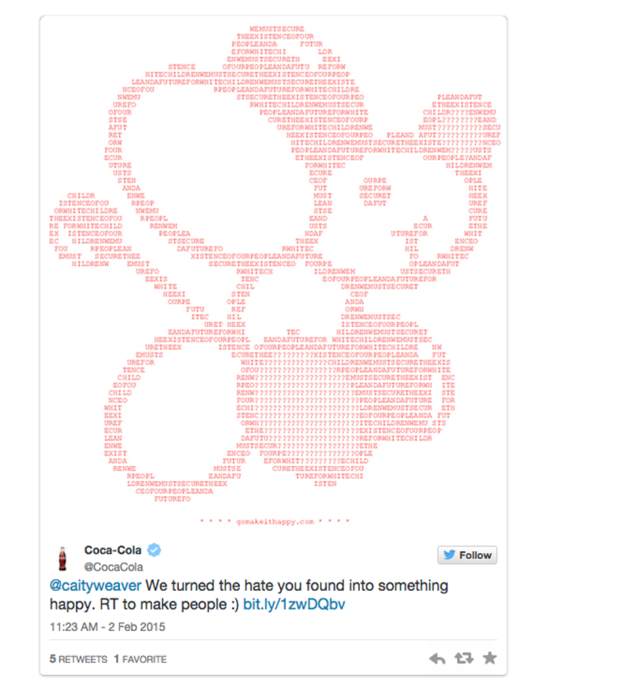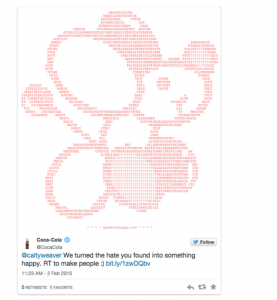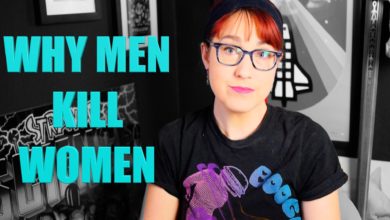Why Trolling Brands Is Different from Threatening People

Like most things, this shouldn’t need explanation, but there are people on the internet and people are the worst, so it needs explaining. I actually wrote this out a few days ago and thought it too obvious to post, then ran across this comment that needed dissecting. So here we go.
Media darling, or shall I say the darling (not-so-)nü media site, Gawker recently trolled Coca-Cola’s well-intentioned but ultimately ill-advised #MakeItHappy marketing campaign, which aimed to make any tweeted phrase a “happy” one by automatically creating adorable ASCII art from it. A nice thought, perhaps, especially amid the abusive shithole that Twitter can be (or just is?), but far too easy to take advantage of – not to mention entirely dismissive of the nuances of harassment.
To exploit the campaign, Gawker’s Caity Weaver first tried tweeting a white nationalist phrase, which Coca-Cola quickly met with a happy balloon animal:
“This, the fourteen-word slogan of white nationalism, seems ‘off-brand’ for Coca-Cola,” Gawker noted of the automated ASCII creation. Then, Gawker created a Twitter bot dedicated to tweeting excerpts from Mein Kampf using the #MakeItHappy hashtag, which Coca-Cola met with even greater enthusiasm, and additional balloon animals.
After realizing that its association with white supremacy had become uncomfortably public, Coca-Cola quickly brought the #MakeItHappy campaign to an end. It’s not the first marketing campaign to implode, online or elsewhere, for reasons of poor planning or execution. What set this experience apart somewhat is the incredibly quick backlash against Gawker itself for attacking a brand. Many people, including plenty of GamerGate fans (who’d earlier convinced advertisers to pull ads from Gawker), were quick to criticize Gawker for trolling Coca-Cola, disingenuously questioning why trolling Coke was okay but trolling actual humans isn’t.
Since this concept is tough for some people to grasp, let’s discuss it a bit. Citizens United (ugh) aside, corporations aren’t the same as people. Said another way, brands are not your friends. That means trolling big, powerful brands (especially those that are themselves complicit in many forms of racism, sexism, and oppression, if under a pretty red veneer) is incredibly different from threatening individual, oppressed human beings. The fact that some people have difficulty with this concept says way more about them than it does about Gawker.
But not understanding (or refusing to understand) the big problems with conflating HappyGate and GamerGate is just part of what’s worrying about the campaign. An even larger social tendency – to suppress emotional discord and encourage false cheer – is at play in Coca-Cola’s campaign. While a cute ASCII icon could certainly temporarily cheer you up (slash distract you from the many wrongs of society!), it does nothing to dismantle the often-oppressive power structures and problematic beliefs that exacerbate the righteous anger and debilitating depression many people feel. In fact, it simply serves as a dangerous distraction from them, one that allows those power structures and twisted beliefs to continue on without being called out.
It’s a nice idea, to think that a hashtag or a drink of Coke could make everything better. And sometimes, temporarily, they might make us feel better. But there are countless serious global issues that can’t be fixed this way, including many that Coca-Cola has been directly involved with. Pretending that we can ever tweet the pain away is not just ludicrous but obscures actual issues.
A Gawker commenter (of all people!) may have said it best: “Turning hate phrases into ASCII art is useless, dumb and does nothing to truly address combating hate.” (That same commenter was then very helpfully and not at all hatefully confronted by a fellow commenter with, “I wish I knew your address so I could shit all over your house, car; seduce your ugly girlfriend and shit on her, then shit on your family for bringing up such a fuckface of a failure.” If only Coke could still #MakeItHappy for us with an ASCII unicorn in response! Then we’d all be friends.)
Other commenters showed a misunderstanding of victim blaming, not recognizing the difference between one human penetrating another human’s body without permission and an internet website issuing criticism of a powerful global brand’s shortsighted marketing campaign. In other news, don’t read the comments. Ever.
While thinking about this campaign, I ran across an older essay, one of so many on the tired old Twee Hipster phenomenon. The essay largely rehashes typical arguments centered on hipster media and fashion choices, but made one key and perceptive point: that the hipster “is easily exploited” – especially by brands.
As powerful corporations dedicate increasing amounts of time to exploiting us and our attention and energy, particularly online, and pretending that a pretense of care equates actual results, we need to remain aware of these well-funded campaigns to exploitation, and resist what they attempt to do to us. As Gawker’s own (via Deadspin) Drew Magary says, “I don’t want everything I fucking see to be a stream of deliberately random shit pre-programmed to go viral.” Our attention is diverted from what matters. Too many people talk about hashtags and ASCII art instead of real issues. The Coke campaign just poured another drop in the bucket of internet inanity, but with a vulgar veneer of helping.
You can be mean to Coke. You can be mean to Gawker. Big brands can take it, and may often deserve it. But don’t be mean to regular people. And remember that actual social wrongs are what deserve your most pressing attention. Not shitty brand campaigns and balloon animal “art.”






I mean, in no way did I have a problem with this situation because I thought that Coke was being oppressed.
My problem with this episode is that Gawker’s trolling involved tweeting racist, hateful content in order to make their point. And it was a point that should have been obvious to everyone to begin with. I mean, really, did any of us need to be reminded that messaging platforms can be hijacked by extremists? And let’s not forget that Gawker’s platform itself has been a major vehicle for harassment as well, with Gawker being at least as derelict as Twitter when it comes to fixing that. The writers as Jezebel had to basically stage a mutiny to even get the problem noticed.
I think that ironic hate speech is still hate speech and the world needs less of that, not more. So, thumbs down to Gawker in this instance.
Quick clarification: I realized it sounds like I’m disputing the premise of the article, but I’m not. I did see this type of behavior in some people’s responses, and I fully agree that Coke is not a person and can’t be victimized in the same way that that actual, real people can.
There’s also the difference between the style of troll. Making the ’14 words’ into an ASCII balloon animal is just a one-time thing.
The trolls who go after Anita Sarkeesian or Zoe Quinn or Rebecca Watson don’t do it one time. First, the doxxing. Secondly, they keep at it. It’s not even really fair to call them trolls, since, while their position is so vile and often petty that I can’t imagine one sincerely holding that position, much less a whole chan, I also can’t imagine anyone going that far without sincerely holding that position. (And, by definition, sincerity puts you in the ‘not a troll’ category.)